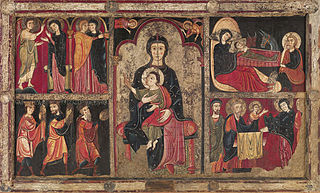 W
WThe Altar frontal from Avià is a rare Romanesque altar frontal exhibited at the National Art Museum of Catalonia in Barcelona. It is the front of the altar of the church of St. Mary of Avià, in the county of Berguedà, later moved to MNAC Barcelona, while the church has a replica in place. It is dated to the 13th century or earlier, and was painted by an unknown artist.
 W
WThe Altar frontal from Cardet is an altar conserved at the Museu Nacional d'Art de Catalunya, in Barcelona.
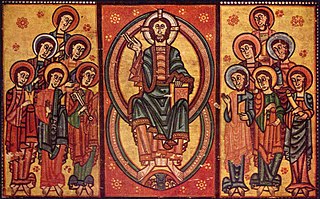 W
WThe Altar frontal from La Seu d'Urgell or of The Apostles is a Romanesque altar frontal currently exhibited at the National Art Museum of Catalonia. The work dates from the second quarter of the 12th century and comes from a church of the Bishop of La Seu d'Urgell and was acquired in 1905. It is one of the masterpieces of the collection of panel painting of the MNAC. The frontal, the item covering the front of the altar, stands out for the quality of its bright colours and because it illustrates some of the characteristics of composition in Romanesque art, such as bilateral symmetry, abstraction of the background, with no reference to space or context, and the unnatural geometrical treatment of form to be observed in the folds of the clothing. It also shows certain conventions of representation, such as so-called hierarchical perspective, which consists in representing the chief character in a larger size.
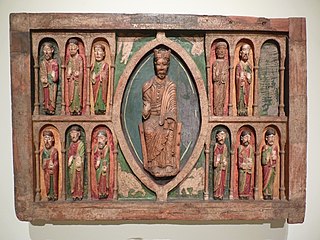 W
WThe Altar frontal from Santa Maria in Taüll is an altar frontal exhibited at the National Art Museum of Catalonia in Barcelona.
 W
WThe Altar frontal from Tavèrnoles is Romanesque altar frontal exhibited at the National Art Museum of Catalonia in Barcelona.
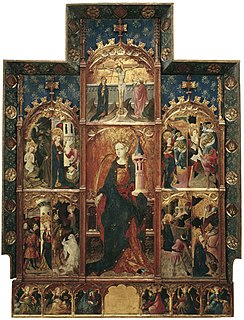 W
WThe Altarpiece of Saint Barbara is a painting by Gonçal Peris conserved at the National Art Museum of Catalonia.
 W
WThe Altarpiece of the Saints John is a painting by Bernat Martorell conserved at the National Art Museum of Catalonia.
 W
WThe Apostles from Àger is a painting exhibited at the National Art Museum of Catalonia in Barcelona.
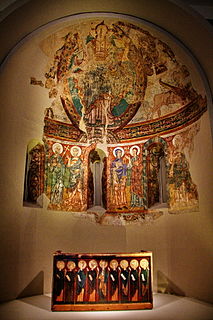 W
WThe Apse from La Seu d'Urgell is an apse exhibited at the National Art Museum of Catalonia in Barcelona.
 W
WThe Apse of Sant Climent de Taüll is a Romanesque fresco in the National Art Museum of Catalonia, Barcelona. This is one of the masterpieces of the European Romanesque. from which the unknown Master of Taüll takes his name. Painted in the early 12th century, it was in the church of Sant Climent de Taüll at the Vall de Boí, Alta Ribagorça in the Catalan Pyrenees until removed in 1919-1923, along with other parts of the fresco decoration, in an attempt to preserve the paintings by placing them in a stable, secure museum setting.
 W
WThe Apse of Santa María d'Àneu is a romanesque apse of the church of Santa Maria, Àneu, the transferred frescos from which are now exhibited at Museu Nacional d'Art de Catalunya, in Barcelona. The decoration of the apse of the church of Santa María d’Àneu combines themes and motifs from the Old and New Testaments. Originally painted at the Church of Santa María d’Àneu
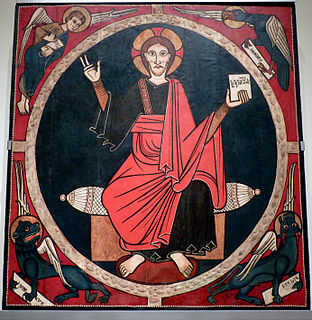 W
WThe Baldachin from Tost is a painted baldachin exhibited at the National Art Museum of Catalonia in Barcelona.
 W
WChrist Bearing the Cross is a 1590-1595 painting by El Greco.
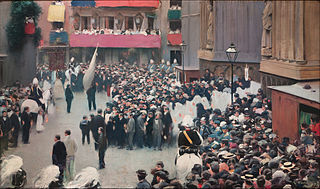 W
WThe Corpus Christi Procession Leaving the Church of Santa Maria del Mar is an oil painting by Ramon Casas painted in 1898 in Barcelona and currently in the Museu Nacional d'Art de Catalunya in Barcelona.
 W
WThe Gothic altarpiece of Santes Creus is an altarpiece painted by Guerau Gener and Lluís Borrassà between 1407 and 1411. It is one of the key works of the International Gothic altarpieces in Catalonia, created for the Santes Creus Monastery. The MNAC museum retains the Nativity, crowned by the figure of St. John the Evangelist, and the Resurrection of Christ, while the rest of the tables are kept in one of the chapels of the cathedral of Tarragona. The altarpiece was commissioned to Pere Serra but apparently died without starting it. Guerau Gener, a connoisseur of València international Gothic, replaced him, but his untimely death made Lluís Borrassà, one of the major figures in the painting of the first international Catalan Gothic, to complete the project.
 W
WThe Great Day of Girona, originally El gran dia de Girona, is a large oil painting by Ramon Martí Alsina depicting an important victory of Girona's defenders over the French during the Third Siege of Girona in 1809. Completed in 1864, it is the largest easel painting in the history of Catalan art. The creation process took more than 10 years and led the artist nearly to financially ruin on several occasions. The painting became part of the collection of the Museu Nacional d'Art de Catalunya, and it is on permanent display in the Girona in an auditorium of the Catalan Government building.
 W
WThe Immaculate Conception is a painting by Francisco de Zurbarán, executed in 1632, conserved at the National Art Museum of Catalonia.
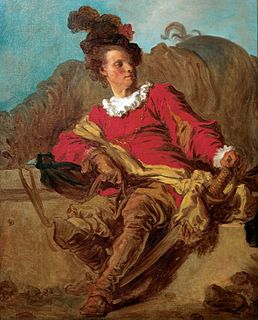 W
WThe Jean-Claude Richard, Abbot of Saint-Non, Dressed à l'Espagnole is a painting by Jean-Honoré Fragonard conserved at the National Art Museum of Catalonia.
 W
WThe Madonna of Humility is a tempera on wood painting by Fra Angelico, executed in 1433-1435, which belongs to the Thyssen-Bornemisza Museum in Madrid and is conserved on loan at the National Art Museum of Catalonia.
 W
WThe Martyrdom of Saint Bartholomew is a painting by Jusepe de Ribera conserved at the National Art Museum of Catalonia.
 W
WThe Mural Paintings from the Herrera Chapel is group of mural painting by Annibale Carracci and collaborators, conserved between the National Art Museum of Catalonia and de Museo del Prado.
 W
WThe Mural paintings of the Conquest of Majorca is a group of paintings conserved at the National Art Museum of Catalonia, in Barcelona, Catalonia, Spain.
 W
WThe Odalisque is a painting by Marià Fortuny exhibited at the National Art Museum of Catalonia in Barcelona.
 W
WOver My Dead Body, 1893, is a painting by Ramon Casas, in the National Art Museum of Catalonia in Barcelona.
 W
WThe paintings from Arlanza are a set of frescos belonging to the mural decoration of a Benedictine monastery of San Pedro de Arlanza, in the Province of Burgos, Castile and León, Spain, dating to around 1210, and now dispersed among a number of collections. The Spanish government began to detach and sell sections of the frescos in the 19th century, though less exciting sections remain in situ. The largest group of six major fragments has moved to the National Art Museum of Catalonia of Barcelona in 1943. Most of the Romanesque mural painting that has survived is of religious subjects, but there was also find decoration of a courtly or profane nature in large monastic centres, such as Arlanza in Castile, and these fragments represent especially rare survivals. According to C. R. Dodwell, the "imposing" Arlanza paintings are "endowed with all the power and grandeur of Romanesque at its best".
 W
WThe Paintings from El Burgal is group of paintings exhibited at the National Art Museum of Catalonia in Barcelona.
 W
WThe Paintings from Sant Joan in Boí is a group of Catalan Romanesque paintings exhibited at the National Art Museum of Catalonia in Barcelona.
 W
WThe Paintings from Santa Maria in Taüll are a set of frescos conserved at the Museu Nacional d'Art de Catalunya, in Barcelona.
 W
WLa Paloma is an oil on canvas painting by Catalan painter Isidre Nonell, created in 1904, which is exhibited at the National Art Museum of Catalonia in Barcelona.
 W
WPortrait of My Father is a 1925 painting by Salvador Dalí of his father, Salvador Rafael Aniceto Dalí Cusí, currently exhibited at the National Art Museum of Catalonia (MNAC).
 W
WRamon Casas and Pere Romeu in an Automobile is a painting by Ramón Casas that is exhibited at the National Art Museum of Catalonia in Barcelona. It features two people in an early car.
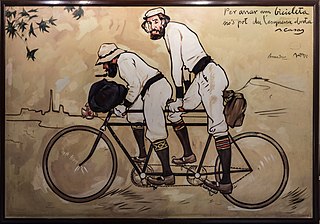 W
WRamon Casas and Pere Romeu on a Tandem is a painting by Ramon Casas in exhibition at the National Art Museum of Catalonia in Barcelona.
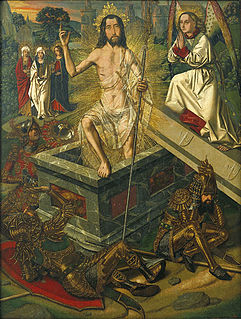 W
WResurrection is a painting by Bartolomé Bermejo conserved at the National Art Museum of Catalonia.
 W
WSaint Agnes is a painting currently exhibited at the National Art Museum of Catalonia.
 W
WThe Saint Augustine Altarpiece is a Catalan Gothic painting in egg tempera by Jaume Huguet and Pau Vergós made between 1462 and 1475. The long duration of the work was caused by financial reasons, and it is assumed that work was begun by Huguet and finished by other members of his workshop, in particular Pau Vergós. The altarpiece was commissioned by the guild of tanners to be placed on the altar of the Augustinian friary of Sant Agustí Vell in Barcelona, Spain. The panel measures 250 x 193 x 9.5 cm and has been in the Museu Nacional d'Art de Catalunya (MNAC) in Barcelona since 1927.
 W
WSaint Candidus is a painting by Ayne Bru conserved at the National Art Museum of Catalonia.
 W
WSaint Paul is a painting by Diego Velázquez that is in the Museu Nacional d'Art de Catalunya in Barcelona, Spain. The piece was created around 1619 during the early stage of Velázquez's artistic career before he moved to Madrid. At this stage of Velazquez's career he was deeply influenced by Caravaggio. In the image, Saint Paul is seated holding a book, commonly referenced as a large Gospel book.
 W
WSaint Peter and Saint Paul is a painting by the Cretan-Spanish artist El Greco. The work was completed between 1590 and 1600. It is currently on display at the Museu Nacional d'Art de Catalunya, who purchased the work in 1932.
 W
WThe Sciarra Madonna is an oil on canvas painting attributed to Titian, signed "TITIANVS" and dated to circa 1540. It is now in the Museu Nacional d'Art de Catalunya in Barcelona.
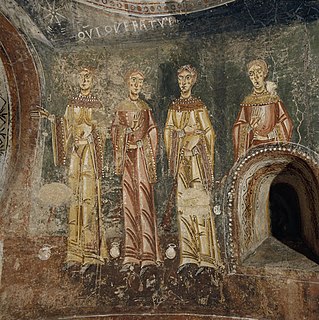 W
WThe Southern apse from Pedret is a fresco painting which was acquired during the 1919-1923 campaign of the Junta de Museus. The artwork originated from the southern apsidiole of the Church of Sant Quirze de Pedret and is currently exhibited in the Romanesque Art collection at the Museu Nacional d’Art de Catalunya, Barcelona, Spain.
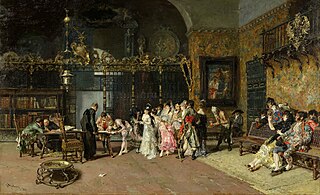 W
WThe Spanish Wedding or La Vicaría (1868-1870) is a masterwork by Marià Fortuny i Marsal, also known as Marià Fortuny or Mariano Fortuny. La Vicaría exemplifies genre painting of the 19th century. The use of jewel tones, contrasts between light and dark, and the virtuosity of the work attest to Fortuny's talent. It resides at Museu Nacional d'Art de Catalunya in Barcelona, Spain.
 W
WStill Life with Pots is the title of two 1650 paintings by Francisco de Zurbarán. The autograph version is now in the Museo del Prado, to which it was donated in 1940 by the collector Francesc Cambó. He also collected a second copy of the composition, which is now in the National Art Museum of Catalonia in Barcelona.
 W
WTerraced Village is a painting by Joaquim Mir currently exhibited at the National Art Museum of Catalonia.
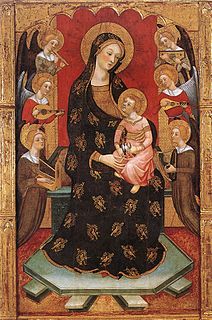 W
WThe Virgin of the Angels is a painting by Pere Serra conserved at the National Art Museum of Catalonia.
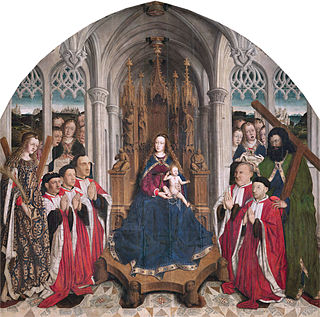 W
WThe Virgin of the Consellers is a painting by Lluís Dalmau conserved at the National Art Museum of Catalonia.
 W
WThe Woman in Hat and Fur Collar is a painting by Pablo Picasso executed in 1937 and exhibited at the National Art Museum of Catalonia in Barcelona, Spain.